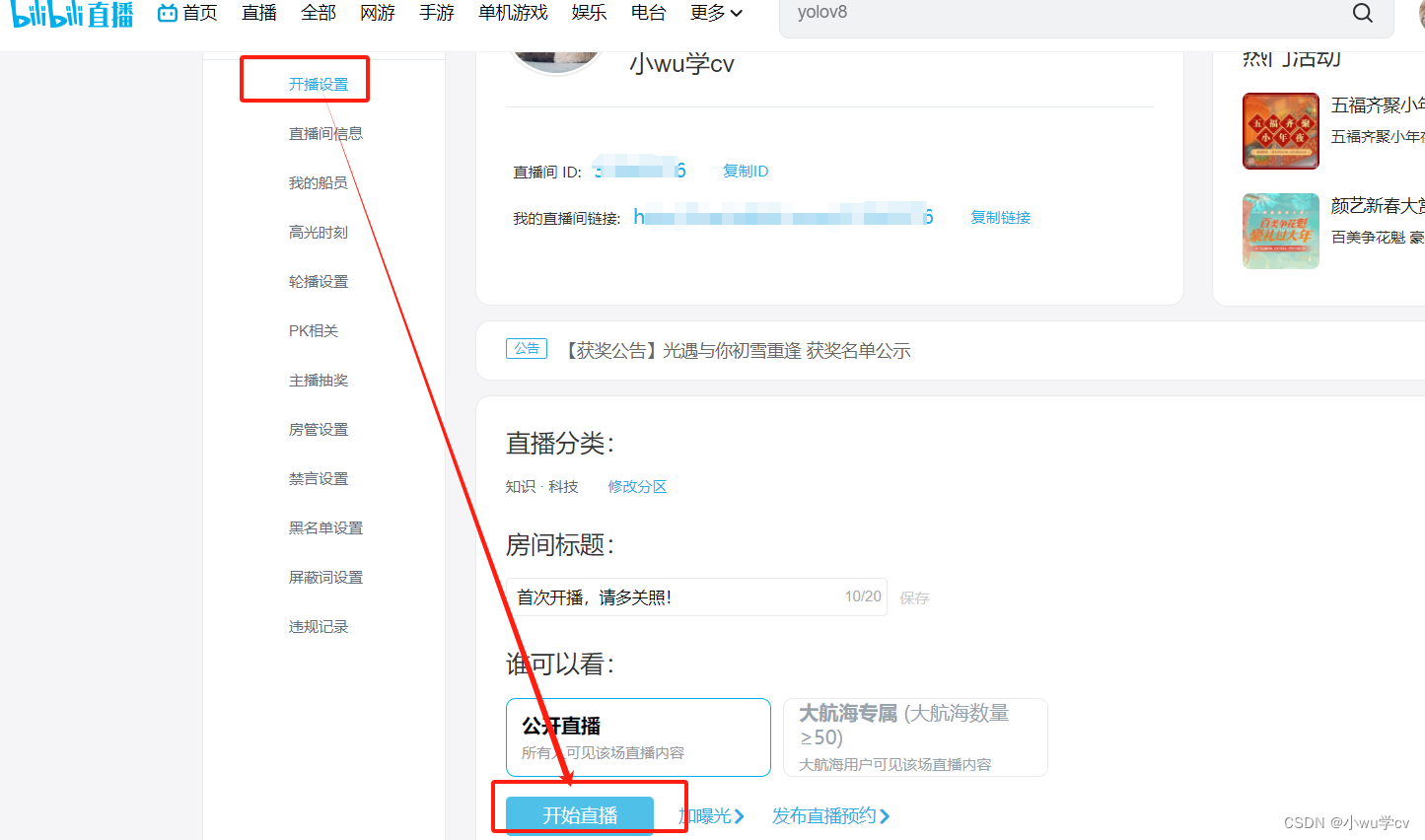在使用FFmpeg处理视频文件时,会遇到需要提取视频流的情况。例如有一个H264编码的mp4文件,需要提取帧数据送到解码器解码,这时候过滤器就派上用场了。
为什么要这么干,因为我用的是自有的硬件解码器,还未集成到FFmpeg中,没法在FFmpeg中直接调用。
对于H264裸流文件,一般使用的AnnexB格式,每一帧由NAL单元加上一个起始码组成(三字节00 00 01或者四字节00 00 00 01)。解码器就是根据这个头来分割数据的。
在mp4(H264编码)文件中,一般使用的是AVVC格式,因为封装了同步信息,就去掉了上述的起始码,如果见数据直接丢到解码器,解码器是没法找到数据头进行解码的,因此需要过滤器来为数据加上这个起始码。h264_mp4toannexb码流过滤器就解决了这个问题。它识别文件头,并提取里面的extradata,extradata这个数据就是封装信息。然后给每个NAL单元添加上起始码,再把数据送到硬件解码器。
对于mp4(H265编码)文件,则使用hevc_mp4toannexb。
在wrap的使用博文中介绍了裸流解码,这时候如果搭配了FFmpeg的过滤器,即可以实现读取mp4文件,通过过滤器分离出裸H264数据,然后送到解码器解码,实现对封装数据的解码。
这里给出一个实现参考,从imx的hantro中抠出来的,从中也可以一窥用法,支持的FFmpeg版本比较旧,有时间再整理下新版的代码。貌似新版的FFmpeg将过滤器集成到了读入视频的过程,不需要额外处理了。
/*------------------------------------------------------------------------------
-- Copyright (c) 2015-2017, VeriSilicon Inc. All rights reserved --
-- Copyright (c) 2011-2014, Google Inc. All rights reserved. --
-- Copyright (c) 2007-2010, Hantro OY. All rights reserved. --
-- --
-- This software is confidential and proprietary and may be used only as --
-- expressly authorized by VeriSilicon in a written licensing agreement. --
-- --
-- This entire notice must be reproduced on all copies --
-- and may not be removed. --
-- --
--------------------------------------------------------------------------------
-- Redistribution and use in source and binary forms, with or without --
-- modification, are permitted provided that the following conditions are met:--
-- * Redistributions of source code must retain the above copyright notice, --
-- this list of conditions and the following disclaimer. --
-- * Redistributions in binary form must reproduce the above copyright --
-- notice, this list of conditions and the following disclaimer in the --
-- documentation and/or other materials provided with the distribution. --
-- * Neither the names of Google nor the names of its contributors may be --
-- used to endorse or promote products derived from this software --
-- without specific prior written permission. --
--------------------------------------------------------------------------------
-- THIS SOFTWARE IS PROVIDED BY THE COPYRIGHT HOLDERS AND CONTRIBUTORS "AS IS"--
-- AND ANY EXPRESS OR IMPLIED WARRANTIES, INCLUDING, BUT NOT LIMITED TO, THE --
-- IMPLIED WARRANTIES OF MERCHANTABILITY AND FITNESS FOR A PARTICULAR PURPOSE --
-- ARE DISCLAIMED. IN NO EVENT SHALL THE COPYRIGHT HOLDER OR CONTRIBUTORS BE --
-- LIABLE FOR ANY DIRECT, INDIRECT, INCIDENTAL, SPECIAL, EXEMPLARY, OR --
-- CONSEQUENTIAL DAMAGES (INCLUDING, BUT NOT LIMITED TO, PROCUREMENT OF --
-- SUBSTITUTE GOODS OR SERVICES; LOSS OF USE, DATA, OR PROFITS; OR BUSINESS --
-- INTERRUPTION) HOWEVER CAUSED AND ON ANY THEORY OF LIABILITY, WHETHER IN --
-- CONTRACT, STRICT LIABILITY, OR TORT (INCLUDING NEGLIGENCE OR OTHERWISE) --
-- ARISING IN ANY WAY OUT OF THE USE OF THIS SOFTWARE, EVEN IF ADVISED OF THE --
-- POSSIBILITY OF SUCH DAMAGE. --
--------------------------------------------------------------------------------
------------------------------------------------------------------------------*/
#include "libav-wrapper.h"
#include "libavcodec/avcodec.h"
#include "libavformat/avformat.h"
#include "libavcodec/bsf.h"
#include "libavutil/mem.h"
#include <assert.h>
#include <stdio.h>
#include <stdlib.h>
#include <string.h>
static AVFormatContext *p_format_ctx = NULL;
static AVCodecContext *p_codec_ctx = NULL;
static AVCodecParameters *origin_par = NULL;
//gan 20230907 AVBitStreamFilterContext is instand by AVBSFContext
//static AVBitStreamFilterContext *bsfc = NULL;
static AVBSFContext *bsfc = NULL;
static int video_stream = -1;
static int raw_h264 = 0;
uint8_t *byte_buffer = NULL;
int byte_buffer_size = 0;
static int num;
void libav_init() {
//av_register_all();
//av_log(NULL, AV_LOG_INFO, "Using %snConfig: %snn", LIBAVCODEC_IDENT,
// avcodec_configuration());
}
void libav_release() {
if (bsfc)
//av_bitstream_filter_close(bsfc);
av_bsf_free(bsfc);
if (p_format_ctx)
avformat_close_input(&p_format_ctx);
}
int libav_open(const char *fname) {
printf("libav_openn");
num = 1;
/* Open video file */
if (avformat_open_input(&p_format_ctx, fname, NULL, NULL) != 0) {
av_log(NULL, AV_LOG_ERROR, "Couldn't open file!n");
return -1;
}
/* Retrieve stream information */
if (avformat_find_stream_info(p_format_ctx, NULL) < 0) {
/* this is not fatal error, yet */
av_log(NULL, AV_LOG_ERROR, "Couldn't find stream information!n");
}
/* Dump information about file onto standard error */
av_dump_format(p_format_ctx, 0, fname, 0);
/* Find the video stream */
video_stream = av_find_best_stream(p_format_ctx, AVMEDIA_TYPE_VIDEO, -1, -1, NULL, 0);
if (video_stream < 0) {
av_log(NULL, AV_LOG_ERROR, "Didn't find a video stream!n");
return -1;
}
origin_par = p_format_ctx->streams[video_stream]->codecpar;
/* Get a pointer to the codec context for the video stream */
//p_codec_ctx = p_format_ctx->streams[video_stream]->codec;
p_codec_ctx = avcodec_alloc_context3(avcodec_find_decoder(origin_par->codec_id));
avcodec_parameters_to_context(p_codec_ctx, origin_par);
printf("p_format_ctx->iformat->long_name,%sn", p_format_ctx->iformat->long_name);
if (!av_strcasecmp(p_format_ctx->iformat->long_name, "raw H.264 video")) {
raw_h264 = 1;
printf("raw_h264n");
} else {
/* have to use a filter to get the byte stream out */
//bsfc = av_bitstream_filter_init("h264_mp4toannexb");
printf("not h264,have to filtern");
const AVBitStreamFilter *pfilter = av_bsf_get_by_name("h264_mp4toannexb");
av_bsf_alloc(pfilter, &bsfc);
if (!bsfc) {
av_log(p_codec_ctx, AV_LOG_ERROR,
"Couldn't open the h264_mp4toannexb BSF!n");
return -1;
}
}
//byte_buffer_size = av_image_get_buffer_size(p_codec_ctx->pix_fmt, p_codec_ctx->width, p_codec_ctx->height, 16);
//byte_buffer = av_malloc(byte_buffer_size);
//printf("**byte_buffer_size=%dn", byte_buffer_size);
return 0;
}
//return -1 ,over;0, not video;other, ok
int libav_read_frame(char *buffer) {
//printf("libav_read_framen");
int ret;
uint8_t *frame_data = NULL; // Initialize to NULL
AVPacket *pkt = av_packet_alloc();
pkt->data = NULL;
pkt->size = 0;
ret = av_read_frame(p_format_ctx, pkt);
//read over
if (ret != 0) {
return 0;
}
for(int i=0;i<pkt->size;i++)
printf("%2d ", *(pkt->data+i));
if(ret == 0 && pkt->stream_index == video_stream){
printf("av_read_frame, num=%d, pkt->size=%dn", num++, pkt->size);
if (!raw_h264) {
uint8_t *orig_extradata = NULL;
int orig_extradata_size = 0;
orig_extradata_size = p_codec_ctx->extradata_size;
orig_extradata = av_mallocz(orig_extradata_size + AV_INPUT_BUFFER_PADDING_SIZE);
memcpy(orig_extradata, p_codec_ctx->extradata, orig_extradata_size);
//ret = av_bitstream_filter_filter(bsfc, p_codec_ctx, NULL, &frame_data, &frame_size, pkt->data, pkt->size, 0);
av_bsf_send_packet(bsfc, pkt);
printf("av_read_frame, 1, pkt->size=%dn", pkt->size);
ret = av_bsf_receive_packet(bsfc, pkt);
printf("av_read_frame, 2, pkt->size=%dn", pkt->size);
for(int i=0;i<pkt->size;i++)
printf("%2d ", *(pkt->data+i));
if (p_codec_ctx->extradata == NULL) {
p_codec_ctx->extradata = orig_extradata;
p_codec_ctx->extradata_size = orig_extradata_size;
} else {
av_free(orig_extradata);
}
av_bsf_free(&bsfc);
}
memcpy(buffer, pkt->data, pkt->size);
return pkt->size;
}
else{
printf("av_read_frame, no videon");
return 0;
}
}
从中可以看出主要是 这二个函数:
av_bsf_send_packet(bsfc, pkt);
av_bsf_receive_packet(bsfc, pkt);
av_bitstream_filter_filter函数已经被废弃。
如果不想使用FFmepg来读取H264裸流文件,可以参考这篇博文,使用纯C简单实现。
原文地址:https://blog.csdn.net/huntenganwei/article/details/134678936
本文来自互联网用户投稿,该文观点仅代表作者本人,不代表本站立场。本站仅提供信息存储空间服务,不拥有所有权,不承担相关法律责任。
如若转载,请注明出处:http://www.7code.cn/show_41086.html
如若内容造成侵权/违法违规/事实不符,请联系代码007邮箱:suwngjj01@126.com进行投诉反馈,一经查实,立即删除!




